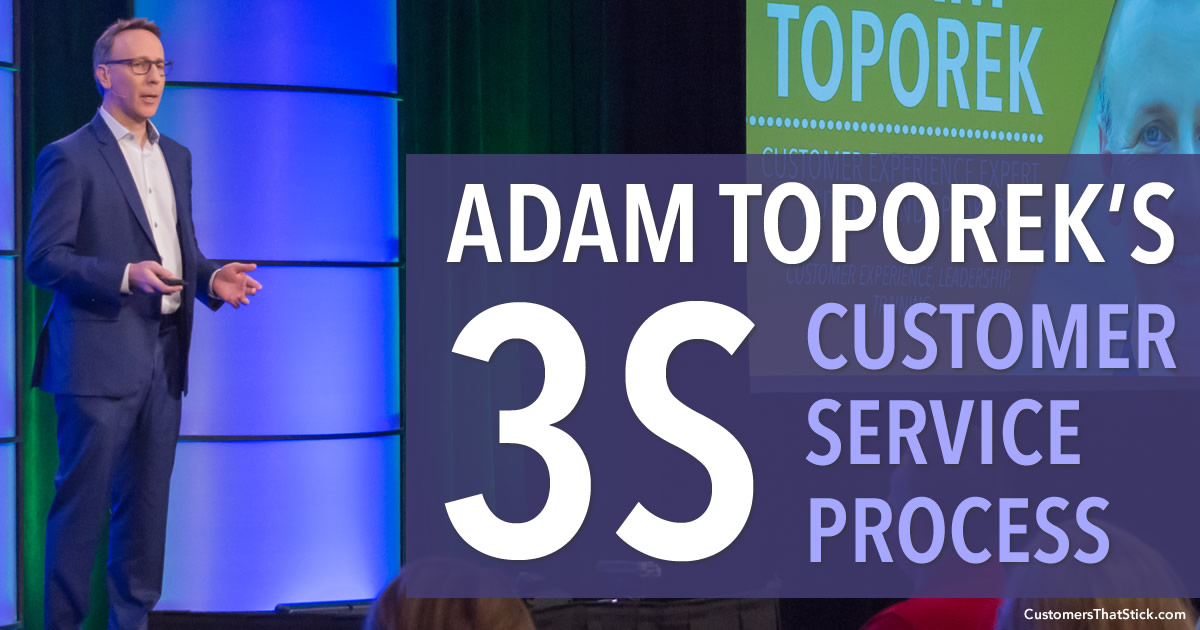
I find it powerful to use processes as teaching tools. Processes help people remember the steps they need to take when executing a strategy — they give a framework for success.
In Be Your Customer’s Hero, I had a chapter devoted to the CATER process, a basic process for resolving customer service issues. CATER stands for
It was a fine process. It was effective as a strategy, and generally reminded you what you wanted to do in working with a customer. As a process and as a learning tool though, I found that it had a few weaknesses.
The first weakness is that, despite the acronym, it was not that easy to remember. Even I, on occasion, would forget what one of the letters meant. If you’re having to think about it as you’re using it, then it’s probably not as effective as it could be as a real-world tool.
The other weakness was that the parts would sometimes need to be deployed out of order in real-world customer service situations. Sometimes, you’d want to thank first — sometimes you’d want to explain early. It depended on the situation. As a teaching tool, I realized that this ambiguity, particularly for those starting out, could sometimes be confusing.
So, I’ve been working for some time to create a process that could improve upon CATER, to correct its weaknesses, and we released the new process to our customer service training clients.
I call it…
The 3S Process is designed to create a memorable customer service framework that applies in virtually every type of service interaction.
The 3S Process is effective because the underlying structure is based on the best order for effectively managing customer psychology, particularly in more challenging service situations.
Whether you are working with a pleasantly confused customers, a mildly frustrated customer or a totally enraged one, the 3S Process will give you the perfect roadmap for handling any customer interaction.
Let’s take a look at each “S”:
Soothe the psyche means to address the customer’s mental state. In this step, you should spend a lot of time listening and trying to understand not only what went wrong but how the customer feels about it.
Focus on establishing rapport and empathizing to guide a customer to a more positive emotional state.
Always focus on establishing rapport and empathizing to guide a customer to a more positive emotional state.
Once you’ve addressed the customer’s emotional state, it’s time to work to resolve the customer’s issue. Of course, in many cases, the “screw up” wasn’t actually something that we did wrong — but the customer feels it’s our fault and that is what matters.
In this step, you want to be both solution focused and action focused, working to find any options you can to successfully resolve the customer’s issue.
This crucial third step is one that so often gets left out. It’s often referred to as “closing the loop,” and it means to circle back with the customer both at the end of the interaction and, when possible, after the interaction is over.
Your goal is to see if there are any unresolved feelings or issues that need to be addressed. All too often, customers that we think are fully resolved are not.
All too often, customers that we think are fully resolved are not. Make sure to close the loop with customers both during and after an interaction.
You can set up the success by proactively making sure that the customer is operationally and emotionally resolved.
Obviously, each “S” above requires much more than a few paragraphs to fully explore and effectively implement, but that is what customer service training is for.
The 3S Process is a top-level approach to any customer service situation.
Any customer-facing professional, from the front lines to the C-suite, can use it as a framework for consistently succeeding with customers.
Comments are closed.
© 2011-2025 CTS Service Solutions, LLC.
All rights reserved.
Legal Information | Privacy Policy
How to Cite this Site
Pingback: 368: When Customer Service Is a Scam
Pingback: 370: How Delta Airlines Encourages Direct Employee Appreciation
Pingback: 372: Are Experience Rewards the New Loyalty Programs?
Pingback: 373: Barry Kirk, A Framework for Customer Loyalty
Pingback: 374: What's More Personal: Twitter or a Phone Call?
Pingback: 5 Sales Techniques that Work in Customer Service
Pingback: 376: 5 Steps to Close the Loop with Customers
Pingback: 380: Bourbon Summit #3
Pingback: How to Handle Customer Threats